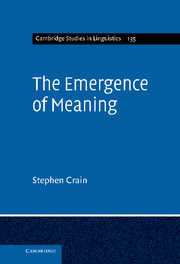Book contents
2 - Competing approaches to language and logic
Published online by Cambridge University Press: 05 November 2012
Summary
Without special training or carefully sequenced input, every normal child acquires a language in just a few years. By 3- or 4-years-old, children around the world have converged on a grammar that is equivalent to that of adult speakers in the same linguistic community. By the time most children begin primary school, they have effectively become adults in their linguistic competence. Children are able to understand an unlimited number of novel sentences, to discern relations of paraphrase and entailment, and to judge the truth or falsity of indefinitely many statements that they may encounter in conversations.
There are two main approaches to the emergence of children’s linguistic abilities. The alternative approaches can be traced back to the nature versus nurture debate about how knowledge is acquired in any domain. The debate dates back to Plato’s dialogue The Meno. In this dialogue, the Greek philosopher and protagonist, Socrates, attempts to demonstrate to an aristocrat, Meno, that a young slave knows more about geometry than he could possibly have learned from experience. By extension, the term Plato’s Problem refers to any gap between one’s experience and the knowledge that one has attained. If experience is not required to attain knowledge, then it is arguably innately specified. Logical nativists follow in the footsteps of Socrates. Logical nativists contend that young children know more about the meanings of logical expressions and the combinatory laws of logic than they could possibly have learned from experience. According to logical nativism, children’s mastery of the language of logic is innately specified, as part of a Universal Grammar. Before we describe the logical nativist approach, let us outline the alternative, experience-based (nurture) approach.
- Type
- Chapter
- Information
- The Emergence of Meaning , pp. 64 - 101Publisher: Cambridge University PressPrint publication year: 2012



